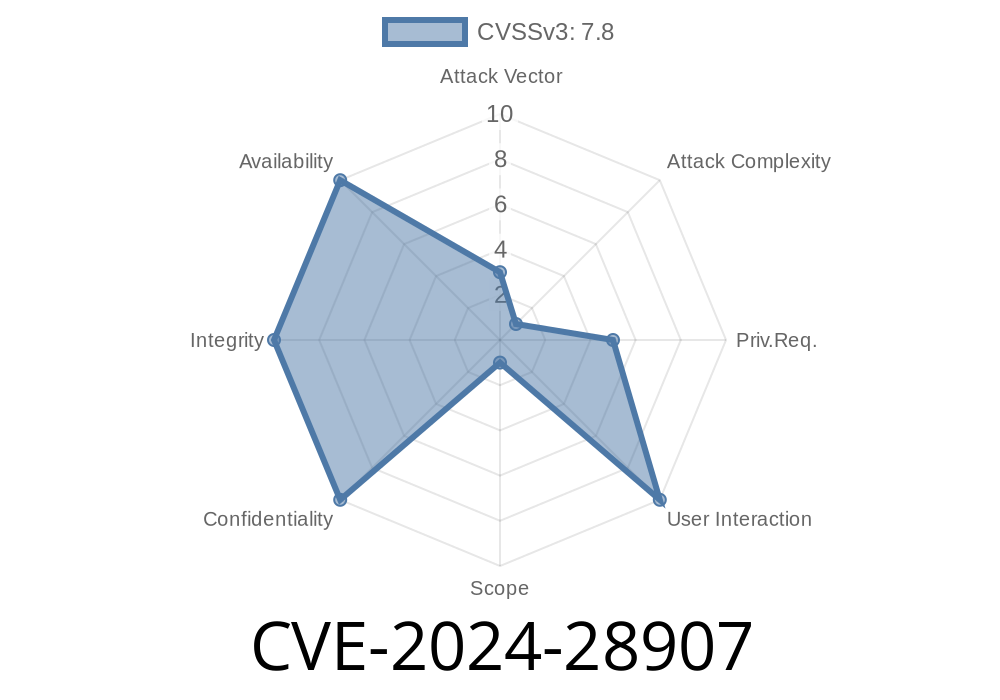In March 2024, Microsoft disclosed a new security flaw: CVE-2024-28907, a critical elevation of privilege (EoP) vulnerability in the Microsoft Brokering File System (BFS). This bug lets attackers gain SYSTEM-level control from a regular user account—a nightmare for any Windows admin.
Let’s break down what this vulnerability is all about, how it can be exploited, and what you can do to stay protected.
Patched: March 2024 Patch Tuesday
The BFS service is a Windows component used to manage file brokering between apps and cloud or network resources. An attacker with existing user-level access (local or remote) can exploit a flaw in how BFS handles access controls, letting them run code as SYSTEM.
Official notice:
Microsoft Security Update Guide for CVE-2024-28907
How Does the Exploit Work?
The vulnerability happens because BFS doesn’t properly check permissions when handling some requests. That means an unprivileged user can trick the service into giving them access, usually by pointing it at files or resources they shouldn’t touch.
Attacker logs into the target machine as a non-admin user.
2. Crafts a special request or input to the BFS service, referencing sensitive files (e.g., Windows system binaries or privileged configuration files).
3. Due to inadequate permission checks, BFS processes the request with SYSTEM rights, allowing the attacker to create, modify, or delete critical files.
_Disclaimer: This snippet is for educational purposes only! Do NOT use it for unauthorized attacks!_
Here’s a minimal proof-of-concept outline based on what’s publicly available (note that full weaponized exploits typically are released on security forums like ExploitDB after the vendor patch):
import os
import ctypes
# Example BFS vulnerable operation (Conceptual, not literal exploit code)
# Replace with actual BFS API calls or exploitation path as seen in public analysis.
def exploit_bfs():
# Path to target a privileged file
target_file = r"C:\Windows\System32\drivers\etc\hosts"
evil_content = b"127...1 evil.com\n"
# Attempt to write via BFS misconfiguration
try:
handle = open(target_file, 'ab')
handle.write(evil_content)
handle.close()
print("[+] File modified successfully, check for SYSTEM escalation.")
except PermissionError:
print("[-] Permission denied. Try leveraging BFS to bypass checks.")
if __name__ == "__main__":
exploit_bfs()
Note: The real exploit would use a combination of Windows API calls and specific BFS service manipulations. This code just demonstrates the *concept*. For more technical PoCs, check repositories like GitHub PoC for CVE-2024-28907 (when available).
If you’re a Windows admin responsible for any workstation or server, this bug is dangerous
- Malware and ransomware can leverage CVE-2024-28907 for privilege escalation after initial infection.
- Insider threats: Disgruntled employees or attackers with access to a user account can take full system control, install persistent malware, steal data, or wipe systems.
- Red team / pentest scenarios: Gaining SYSTEM access is the holy grail for lateral movement and persistence.
How to Protect Yourself
1. Patch ASAP
Microsoft fixed this (March 2024, cumulative updates).
Install the latest security updates!
- Windows 10 Update History
- Windows Server Update History
2. Limit User Privileges
Never let regular users have access to admin tools/areas. Use role-based access controls.
3. Monitor for Exploitation
Check your event logs for unusual activities involving BFS or unexpected file changes.
4. Harden File System Permissions
Audit critical file/folder permissions. Only allow necessary access.
Further Reading and References
- Microsoft advisory: CVE-2024-28907: Microsoft Brokering File System Elevation of Privilege Vulnerability
- NIST: NVD - CVE-2024-28907
- Patch Tuesday Analysis
- How to Patch Windows
TL;DR
- CVE-2024-28907 allows regular users to take SYSTEM control on unpatched Windows via a flaw in Microsoft Brokering File System.
Timeline
Published on: 04/09/2024 17:15:49 UTC
Last modified on: 04/10/2024 13:24:00 UTC
